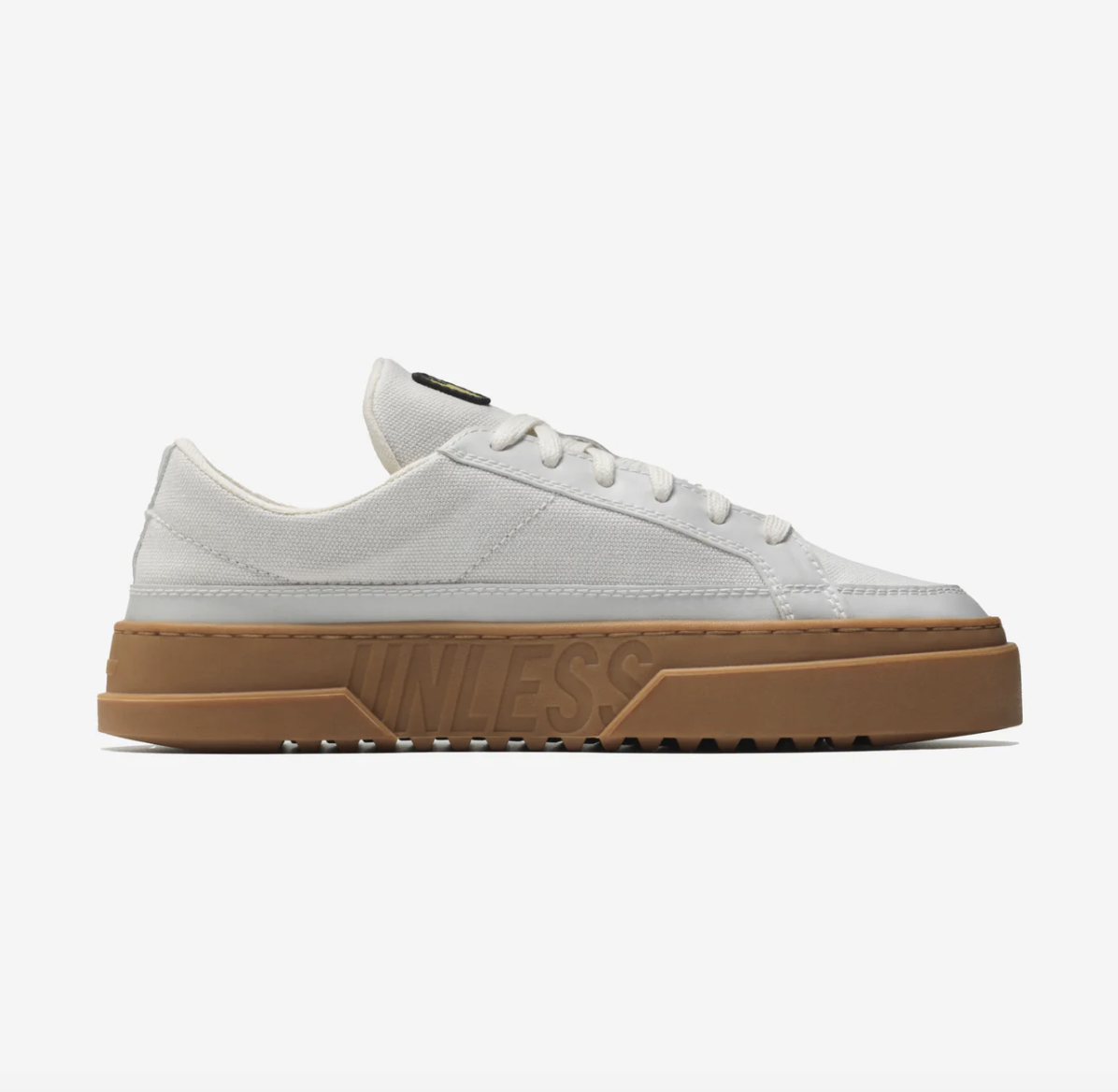Plant-Based. Plastic-Free. Purpose-Driven. Meet the Brand Challenging Sneaker Culture

What happens when one of Adidas’s top executives walks away from a billion-dollar career to build a sneaker that can return to the earth?
I first met Eric Liedtke at SF Climate Week, where he spoke on stage about his decision to leave Adidas and create something entirely different: a sneaker made to decompose. He wasn’t pitching a trend or a product drop—he was talking about materials, legacy, and what it means to take responsibility.
His story sparked a shift in how I thought about fashion—less as a surface-level aesthetic and more as a material system shaped by invisible decisions. I started paying closer attention to what things are made of, and why. This piece is part of that journey: an attempt to understand how the sneaker industry got here, what better could look like, and what it might take to build it.
It didn’t take long to realize that the issues Liedtke was naming weren’t niche—they were everywhere. Especially in footwear.
The Plastic Problem Underfoot
Around 70% of today’s clothing is made from petroleum-based materials—including most sneakers. Soles, foams, reinforcements, linings, and uppers are often made of plastic derivatives that don’t biodegrade and can’t be recycled. These materials accumulate in landfills or get incinerated, releasing harmful chemicals and greenhouse gases. When they break down, they become microplastics that pollute soil, waterways, oceans—and now, our own bodies.
Sneakers are among the worst offenders. An estimated 23 billion pairs are produced annually, and roughly 300 million are discarded every year. It’s a waste stream with a long tail.
From the Inside Out
Liedtke spent 26 years at Adidas and helped grow the company’s revenue by $9 billion. But even at that level, pushing for deeper sustainability was nearly impossible. Like many in the industry, he had spent years focused on brand growth without fully grappling with the long-term impact of the materials being used.
It wasn’t until he partnered with Parley for the Oceans—an organization turning marine plastic into textiles—that he began to understand the scale of the problem. What started as a well-meaning innovation soon felt like a half-measure. Recycling ocean plastic into sneakers wasn’t solving the issue—it was just delaying it. So he left.
In 2019, Liedtke launched UNLESS Collective, a brand that refuses to use synthetics of any kind. Every component is made from plants, minerals, and natural rubber. The team is rethinking every detail—from glue and foam to printing, dying and stretch materials. Liedtke calls these the "five horsemen" of plastic dependency: each one a systemic obstacle to truly regenerative design.
The Cost of Doing Better
Shortly after hearing him speak, I ordered a pair of UNLESS "Degenerate" sneakers. They’re minimalist, durable, and designed to break down at the end of their life. They cost $149—more than a typical sneaker, but far less than the cost of doing nothing. I love how they look, but more importantly, I love what they represent.
That tension—between messaging and material reality—is something I’ve seen across the industry. Liedtke calls it "green wishing"—making sustainability claims that don’t disrupt the business model. At Adidas, even sourcing recycled PET (which costs ~50% more than virgin plastic) was considered a stretch. Switching to plant-based feedstocks? Nearly impossible inside a system optimized for scale and quarterly earnings.
UNLESS is his answer to that system. But he’s candid about the trade-offs. Since launching, he says he’s been ghosted more than in his entire Adidas career. The doors that once swung open now stay shut. That’s part of the tradeoff when you’re building a slower, more costly, values-first product in a system designed for speed.
He also speaks about legacy. Helping fuel a global plastic problem is something that weighs heavily on him. UNLESS is both a company and a personal reckoning.
Big Vision, Small Steps
The name “UNLESS” comes from Dr. Seuss’s The Lorax—a warning etched into stone after unchecked industrial greed strips the land bare. The full line: “Unless someone like you cares a whole awful lot, nothing is going to get better. It’s not.”
If you want to hear more, Liedtke appears in the Netflix documentary Buy More, where he speaks openly about what he sees as a kind of environmental "sin." That kind of vulnerability is rare at his level—and vital if the industry is going to change.
The Search for Better Sneakers
When I began looking into plastic-free sneakers, I was shocked by how few brands were actually doing it—and how many had already shut down. Even the best ideas struggle to survive in a landscape dominated by legacy supply chains, price expectations, and marketing noise.
That’s what makes UNLESS stand out.
They don’t market themselves as eco anything. Their shoes are bold, minimal, and totally compostable. In 2024, they were acquired by Under Armour—a move that sparked both curiosity and concern. Could a big brand preserve the mission of a tiny regenerative upstart?
Liedtke believes the acquisition was strategic, not compromising. It’s about embedding better systems from the inside. If it works, it could become a template for how incumbents support true material innovation without watering it down.
Want to Go Further?
If you’re looking for other brands exploring plant-based or plastic-free design, I’ve started compiling a Sustainable Sneaker Guide—a living directory of indie and legacy brands pushing toward regenerative futures. It’s part of a broader project to map what better looks like in footwear: beyond buzzwords, beyond greenwashing.
None go as far as UNLESS—yet. But seeing even one brand reimagine the product from the ground up has changed the way I think about sustainability. It’s not just about impact—it’s about intent.
Thanks for reading. Please subscribe if you'd like to stay up to date and receive emails when new content is published!